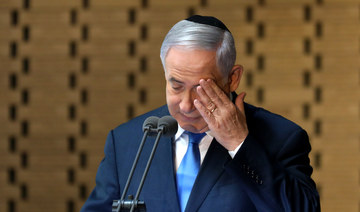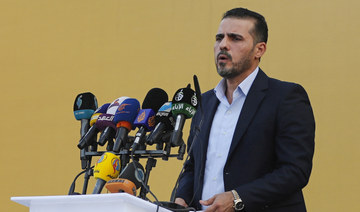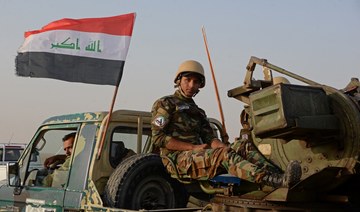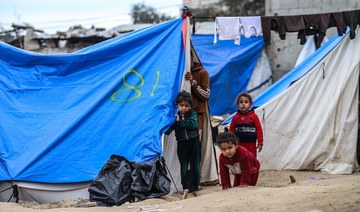NAHARAYIM PARK, Israel: The Naharayim park was established 25 years ago as a symbol of the landmark peace agreement between Israel and Jordan. Now, as the two countries mark a quarter century of official relations, the park and its “Island of Peace” are being shuttered.
It is a fitting reflection of the Israeli-Jordanian relationship — one that began with great promise, but which has been plagued by mistrust, disappointment and missed opportunities. While the peace agreement remains intact, there is a sense on both sides that it should have delivered much bigger dividends.
“I am not certain that we gave it our full attention,” said retired Supreme Court Justice Elyakim Rubinstein, who was Israel’s chief negotiator for the peace deal.
Speaking on Israeli public radio, Rubinstein said there were things Israel could do “to lend a better atmosphere” and suggested Israel show more “respect” for its eastern neighbor. He declined to elaborate.
It is a far cry from the heady times of the peace agreement, signed at an emotional ceremony on Oct. 26, 1994, attended by Israel’s then-prime minister, Yitzhak Rabin, the late King Hussein and President Bill Clinton.
Following up on a historic interim peace deal between Israel and the Palestinians a year earlier, all three leaders delivered moving speeches promising warm relations and a better future.
“This is our gift to our peoples and the generations to come,” said Hussein, who died in 1999. “It will not be simply a piece of paper ratified by those responsible, blessed by the world. It will be real, as we open our hearts and minds to each other.”
Twenty-five years later, the peace agreement remains a vital strategic asset for both countries.
The deal has brought Israel much-needed quiet and a valuable partner along its longest border, while buttressing Jordan’s position as a crucial ally of the West in one of the world’s most volatile areas.
The two countries maintain close, covert security relations. Israel, a world leader in desalination, provides large quantities of water to Jordan, one of the driest countries on earth, and has agreed to sell natural gas to Jordan as well.
But the warm relations envisioned at that signing ceremony remain elusive, and in Jordan there is little public support for the agreement.
Jordan has a long list of complaints — beginning with the deep freeze in the Israeli-Palestinian peace process.
Israel captured the West Bank and east Jerusalem from Jordan in the 1967 Mideast war. Although Jordan has renounced any claims to these territories, which the Palestinians seek as parts of a future state, it retains deep connections.
A majority of Jordan’s population is believed to have Palestinian roots, and Jordan’s King Abdullah II is a strong supporter of the Palestinian cause. Without progress on the Palestinian front, Abdullah is unable — and unwilling — to warmly embrace Israel.
Israel’s policies at Jerusalem’s most sensitive holy site — a hilltop compound known to Jews as the Temple Mount and to Muslims as the Noble Sanctuary — have also put pressure on the king.
Jordan serves as custodian of the site’s Muslim shrines. During Prime Minister Benjamin Netanyahu’s term, visits to the compound by right-wing Jewish groups that want to alter its status have increased, igniting clashes with Muslim worshippers and straining relations with Jordan.
Jordan also remains bitter over a 2017 incident in which an Israeli guard at the Israeli Embassy in Amman shot and killed two Jordanians, saying one had tried to attack him with a screwdriver.
Netanyahu gave the guard a hero’s welcome, infuriating the Jordanians. Diplomatic relations were repaired only months later after Israel expressed “deep regret” and replaced its ambassador.
More recently, Netanyahu angered Jordan by vowing to annex the Jordan Valley — a strategic area of the West Bank along the Jordanian border.
“There is no real social and popular peace between Jordan and Israel,” said Amer Sabaileh, an independent Jordanian analyst.
He said Jordan needs “more understanding from the Israeli side” and that Israel’s approach to various issues has “put Jordan in a very difficult situation.”
Speaking at a Tel Aviv conference last month, Israel’s ambassador to Jordan, Amir Weissbrod, acknowledged that relations aren’t perfect.
But he listed a long line of successes, including the water and energy cooperation, Jordan’s use of Israel’s Haifa port and an expanding program that allows hundreds of Jordanians to enter Israeli border towns to work.
Describing Jordan as a “strategic partner” and gateway to the broader Arab world, Weissbrod said: “We must try to make the utmost effort to ensure the stability and success of Jordan.”
Yet he also said there is more that Jordanian leaders could do, particularly in terms of building support among the Jordanian public.
“They can’t hide the degree of the relationship, and there are achievements to talk about,” he said.
Jordanian officials did not respond to a request for comment.
Against this backdrop, Jordan last year announced that it was ending a special lease agreement under the 1994 treaty that returned two farming areas — Naharayim and Tzofar — to Jordanian sovereignty while allowing Israel continued use of the lands. Without Jordanian objections, the leases for the areas, known in Arabic as Baqura and Ghamr, would have automatically renewed.
Naharayim, located along the Jordan River in northern Israel, has become a popular tourist site. It includes a small park and picnic area, the ruins of a historic power station and the “Island of Peace,” where Israelis can briefly enter Jordanian territory without having to show their passports.
“We regard this place as part of a normalization and relationship with our neighbors from the other side of the border,” said Idan Grinbaum, head of the local regional council. He said he has sent a letter to Abdullah asking the king to reconsider but has not heard back.
The site has a painful history. In 1997, a Jordanian soldier opened fire at an Israeli crowd, killing seven schoolgirls on a class trip.
After the shooting, King Hussein traveled to Israel to ask forgiveness from the girls’ families. Twenty years after his death, Hussein remains a beloved figure in Israel for what was seen as a courageous act.
With the site set to revert to full Jordanian control in early November, Grinbaum said he still hopes that leaders can find a way to preserve Naharayim as a symbol of peace.
“We still think that joint projects can happen here for both countries, for the benefit of citizens in both countries,” he said. “Unfortunately, in reality things are not that simple.”
Israel, Jordan mark 25 years of imperfect peace
Israel, Jordan mark 25 years of imperfect peace
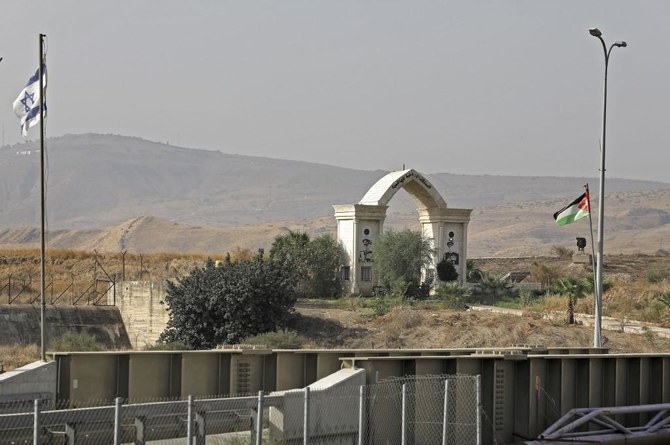
- The peace agreement was signed in 1994
- It happened a year after the interim peace deal between Palestinians and Israelis
Hospital reports 7 killed, several wounded by Israeli strike in Gaza City
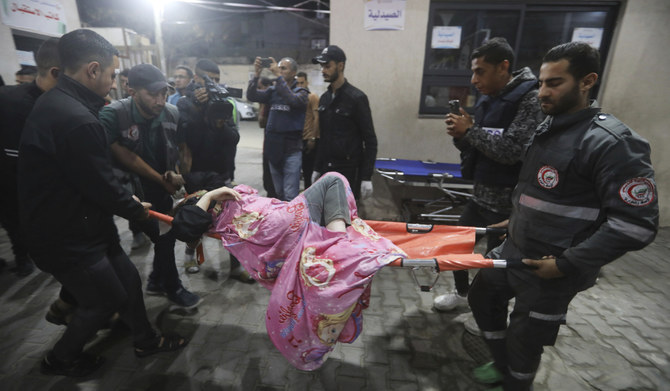
GAZA CITY: An Israeli air strike killed at least seven people and wounded several others early Wednesday in Gaza City, according to a local hospital.
The strike on an apartment in the devastated northern city killed seven members of the same family, the Al-Ahli hospital said, with eyewitnesses on Wednesday also reporting strikes elsewhere in the strip, particularly around Rafah.
Scenes from Israel and Gaza reflect dashed hopes as imminent ceasefire seems unlikely
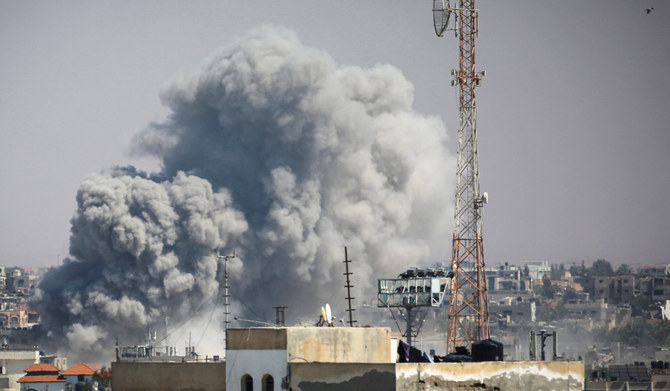
- Israel has killed more than 34,700 Palestinians, according to Gaza’s Health Ministry
- Hundreds of thousands in Gaza have been displaced, many sheltering in nylon tents in Gaza’s south, as “a full-blown famine” develops in the north of the enclave, according to the United Nations
JERUSALEM: An announcement by Hamas late Monday that it had accepted a ceasefire proposal sent people in the streets of Rafah into temporary jubilation, as Palestinian evacuees in the jam-packed town felt their first glimmer of hope the war could end.
For families of Israeli hostages held in Gaza, the announcement raised the possibility that their long wait was coming to an end — that they might soon see their loved ones.
But the fervor was short-lived.
A few hours after Hamas’ announcement, Israel rejected the proposal — which was different from one the two sides had been discussing for days — and said it was sending a team of negotiators for a new round of talks.
By Tuesday morning, Israeli tanks had rolled into Rafah, cementing the dashed hopes among Israelis and Palestinians of any imminent ceasefire.
In Rafah, disillusioned Palestinians spent Tuesday packing up their belongings and preparing to evacuate.
Families of Israeli hostages were incensed, too, and thousands of protesters demonstrated late into the night across the country.
GAZA: PALESTINIANS EVACUATE, CONDEMN COLLAPSE OF DEAL
Across Gaza, Palestinians have been demanding a ceasefire for months, hoping that a stop to the fighting will bring an end to the suffering.
Over 34,000 Palestinians in Gaza have been killed by Israeli fire and airstrikes since the war erupted on Oct. 7., according to the Hamas-run Health Ministry. That day, Hamas militants killed about 1,200 in Israel and took around 250 hostages.
An estimated 100 hostages and the remains of 30 others are still held by Hamas, which insists it will not release them unless Israel ends the war and withdraws from Gaza.
Hundreds of thousands in Gaza have been displaced, many sheltering in nylon tents in Gaza’s south, as “a full-blown famine” develops in the north of the enclave, according to the United Nations.
So when the news came out that Hamas had accepted a ceasefire proposal put forward by Egypt and Qatar, Palestinians poured onto the streets, carrying children on their shoulders and banging pots and pans in excitement. For a moment, it seemed life would get easier.
But in the early hours of Tuesday, Israeli tanks entered the edge of Rafah and took control of one of the key border crossings between Israel and Gaza. Palestinians in the city loaded their belongings onto large trucks and fled.
“They kept giving us hope and telling us tomorrow, or after tomorrow, a truce will take place,” said Najwa Al-Siksik as drones buzzed over her tent camp. “As you can hear,” she said, “this was happening all night long.”
El-Sisik said she had lost all hope of an eventual deal.
“(Israel) doesn’t care about us or our children,” she said. “It only cares about its people. And (Prime Minister Benjamin) Netanyahu only cares about being at the top.”
Raef Abou Labde, who fled to Rafah from the southern Gaza city of Khan Younis earlier in the war, rode atop a car packed with belongings, headed to what was sure to be yet another temporary refuge. Labde said he had little faith that Netanyahu’s far-right government sincerely wanted a ceasefire deal.
“I hope to God that the truce happens,” he said. “But what I see is that Netanyahu doesn’t want a ceasefire. He wants to displace the Palestinian people to Sinai, destroy Gaza and occupy it.”
ISRAEL: PROTESTS GROW, DEMANDING NEW DEAL NOW
In Israel, the Hamas announcement did not provoke the kind of immediate celebrations seen in Gaza. Many relatives of hostages held in Gaza, who have seen what feels like countless rounds of ceasefire negotiations end with no deal, have grown jaded.
“We won’t believe there’s a deal until we start to see some hostages return home,” said Michael Levy, whose 33-year-old brother, Or Levy, remains in captivity.
Still, the back and forth between Israel and Hamas led to boisterous and sustained protests Monday night. Protesters, led by hostage families, blocked the main highway into Tel Aviv, lighting fires on the road.
Demonstrations also broke out in Jerusalem, Haifa, and Beersheba.
Hostage families slammed the government’s inaction on a possible deal in a hearing at Israel’s parliament Tuesday.
“We see all sorts of explanations — this isn’t the deal that we gave them, Hamas changed it,” said Rotem Cooper, whose father Amiram Cooper was kidnapped Oct. 7. He questioned whether military pressure was an effective bargaining tactic to force Hamas to release additional hostages.
For some, the news indicated that a deal was closer than ever before.
Sharone Lifshitz, whose father, Oded, is a hostage, said she believed the differences between the proposal Hamas had accepted and Israel’s “core demands” were not so wide.
“Hamas are shrewd operators,” she said. “Now it’s going to be hard for Israel to just say ‘no.’”
Others said they hoped Israel’s movement into Rafah Tuesday was a tactic to pressure Hamas into a mutually agreeable deal.
“This is a way to show that Israel is serious about its demands,” said Levy. “Hamas can’t just declare they have agreed to a deal with changed terms.”
Powerful Iraqi pro-Iran group says US troops must leave
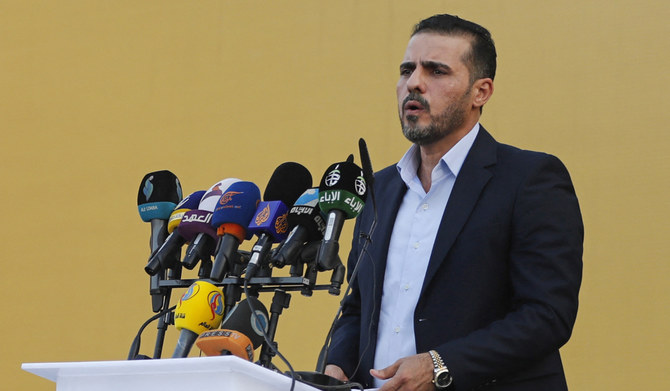
- “We also haven’t seen the necessary seriousness from the Iraqi government to remove them,” the spokesman, Abu Ali Al-Askari, added in a statement
BAGHDAD: Iraq’s powerful Kataeb Hezbollah on Tuesday renewed its call for US troops to withdraw from Iraq, months after the Iran-backed armed group suspended attacks against American forces.
Washington and Baghdad have been engaged in talks over the presence of US troops in Iraq, who are stationed there as part of an international anti-jihadist coalition.
A spokesman for Kataeb Hezbollah said in a statement that the group “did not perceive the American enemy’s seriousness in withdrawing the troops and dismantling its spy bases in Iraq.”
“We also haven’t seen the necessary seriousness from the Iraqi government to remove them,” the spokesman, Abu Ali Al-Askari, added in a statement.
The United States considers Kataeb Hezbollah a “terrorist” group and has repeatedly targeted its operations in recent strikes.
During more than three months, as regional tensions soared over the devastating Israel-Hamas war in Gaza, US troops were targeted more than 165 times in the Middle East, mainly in Iraq and neighboring Syria.
The Islamic Resistance of Iraq, a loose alliance of Iran-backed groups including Kataeb Hezbollah, had claimed the majority of the attacks.
But a deadly drone attack in late January triggered retaliation, with US forces launching dozens of strikes against Tehran-backed groups, including Kataeb Hezbollah.
Three US personnel were killed in the January 28 drone strike in Jordan, near the Syrian border.
Two days later, Kataeb Hezbollah said it was suspending its attacks on US forces.
In February the United States and Iraq resumed talks on the future of the US-led coalition’s presence in Iraq, following a request by Iraqi Prime Minister Mohamed Shia Al-Sudani who has been calling for an end to the coalition’s mission.
The United States has some 2,500 troops in Iraq and 900 in Syria as part of the international coalition against the Islamic State (IS) group.
The coalition was deployed to Iraq at the government’s request in 2014 to help combat IS, which had taken over vast swathes of Iraq and neighboring Syria.
Israel deports a dozen Malawians sent to work on farms

- Israeli farms, a valuable part of the economy, have lost thousands of laborers since the October 7 Hamas attacks triggered the Gaza war
- Israel has killed more than 34,700 Palestinians in Gaza, mostly women and children, according to the health ministry in the Hamas-run territory
LILONGWE, Malawi: Malawi on Tuesday said Israel had deported 12 workers who had walked off farms and orchards, left deserted by the Gaza conflict, that they had been sent to work on.
The workers “in breach of their contracts... abandoned their lawful employment at the farms to start working at the bakery,” Malawi’s government spokesman Moses Kunkuyu said in a statement.
Since November, hundreds of Malawians have flown to Israel as part of a government labor export program aimed at finding jobs for young people and generating desperately needed foreign exchange.
Many Malawians remain without work as the country has been gripped by an economic crisis that has seen massive government spending cuts.
Israeli farms, a valuable part of the economy, have lost thousands of laborers since the October 7 Hamas attacks triggered the Gaza war.
Dozens of foreign workers were among about 240 people that Israel says were kidnapped in the attacks.
Lilongwe cautioned the remaining workers, many of them young men and women, that a breach of contract would “not be tolerated.”
Kunkuyu urged workers to “desist from such behavior as it puts this country into disrepute.”
After being processed, four of the 12 workers arrived back in the southern African country on Tuesday while the other eight would arrive on Wednesday, the state said.
The labor deal has been criticized by rights group and Malawi’s opposition.
In November, the country’s opposition leader Kondwani Nankhumwa as “an evil transaction” because of the threat from the war that has left tens of thousands dead.
“The two governments will ensure the labor export to Israel operates within the prevailing regulatory frameworks,” the Malawian government said.
Two weeks ago, Malawi opened an embassy in Tel Aviv, which its foreign minister Nancy Tembo said reaffirmed the government’s commitment to “long-standing” bilateral relations between the two nations.
She said the labor deal would provide 3,000 workers initially.
US completes construction of Gaza aid pier

WASHINGTON: The US military has completed construction of its Gaza aid pier, but weather conditions mean it is currently unsafe to move the two-part facility into place, the Pentagon said Tuesday.
The pier — which the US military started building last month and which will cost at least $320 million — is aimed at boosting deliveries of desperately needed humanitarian assistance to Gaza, which has been ravaged by seven months of Israeli operations against Hamas.
“As of today, the construction of the two portions of the JLOTS — the floating pier and the Trident pier — are complete and awaiting final movement offshore,” Deputy Pentagon Press Secretary Sabrina Singh told journalists, using an acronym for Joint Logistics Over-the-Shore, the official name for the pier capability.
“Today there are still forecasted high winds and high sea swells, which are causing unsafe conditions for the JLOTS components to be moved. So the pier sections and military vessels involved in its construction are still positioned at the port of Ashdod,” in Israel, Singh said.
US Central Command (CENTCOM) “stands by to move the pier into position in the near future,” she added.
The vessels and the under-construction pier were moved to the port due to bad weather last week. Once the weather clears, the pier will be anchored to the Gaza shore by Israeli soldiers, keeping US troops off the ground.
Aid will then be transported via commercial vessels to a floating platform off the Gaza coast, where it will be transferred to smaller vessels, brought to the pier, and taken to land by truck for distribution.
Plans for the pier were first announced by US President Joe Biden in early March as Israel held up deliveries of assistance by ground, and US Army troops and vessels soon set out on a lengthy trip to the Mediterranean to build the pier.
Some two months later, the humanitarian situation in Gaza remains dire. The United Nations said Tuesday that Israel had denied it access to the Rafah crossing — the key entry point for aid into the besieged territory.
The White House said the closing of Rafah and the other main crossing, Karem Shalom, was “unacceptable” and needed to be reversed.
In addition to seeking to establish a maritime corridor for aid shipments, the United States has also been delivering assistance via the air.
CENTCOM said American C-130 cargo planes dropped more than 25,000 Meal Ready To Eat military rations into Gaza on Tuesday in a joint operation that also delivered the equivalent of more than 13,000 meals of Jordanian food supplies.
“To date the US has dropped 1,200 tons of humanitarian assistance,” CENTCOM said in a statement.
Gaza’s bloodiest-ever war broke out following Hamas’s unprecedented October 7 attack on Israel, which resulted in the deaths of more than 1,170 people, mostly civilians, according to an AFP tally of Israeli official figures.
Israel’s retaliatory offensive has killed at least 34,789 people in Gaza, mostly women and children, according to the Hamas-run territory’s health ministry.




